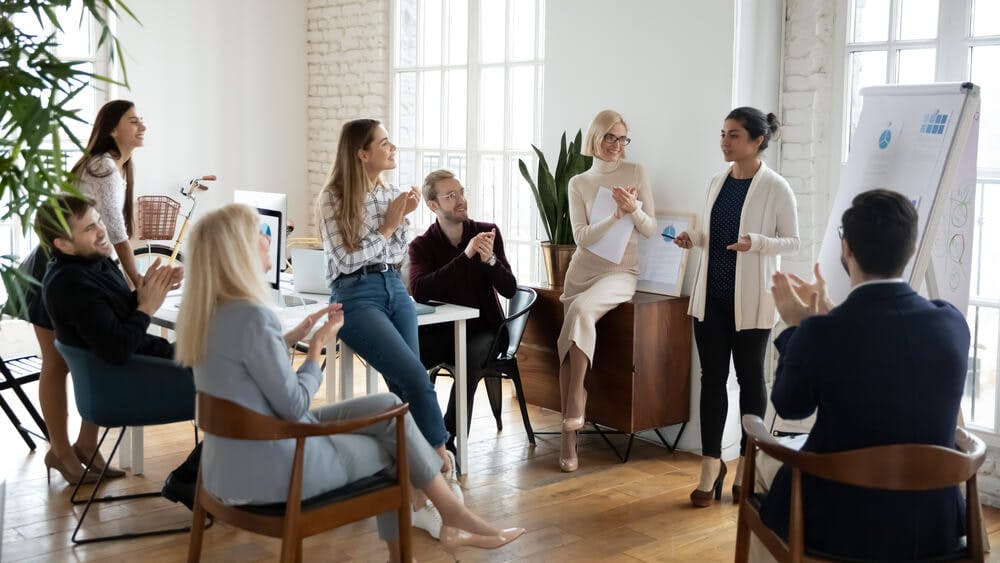Design Thinking in HR: Cultivating Employee-Centric Solutions
Posted by Alexandra Lamb
In the dynamic landscape of Human Resources, the integration of design thinking principles has become a catalyst for transformative change. This case study delves into how HR teams harness design thinking methodologies to craft innovative solutions that prioritise employee experience and foster a culture of continuous improvement.
Design Thinking is a human-centred, iterative problem-solving approach that prioritises empathy, creativity, and experimentation to tackle complex challenges. It revolves around understanding the users' needs, generating diverse ideas, prototyping solutions, and continuously refining them based on feedback. The design thinking process encourages multidisciplinary collaboration and divergent thinking, aiming to uncover innovative solutions that align with the real needs of the end-users. At its core, design thinking is a mindset that values iteration, open-mindedness, and a deep understanding of the human experience, fostering a culture of innovation and empathy-driven problem-solving.
In this blog post we explore the opportunity for HR to integrate more design thinking principles, and how a BOLDLY coach can facilitate deeper insights for program effectiveness.
Understanding the Challenge
The Scenario: A regional business’ HR department observed a decline in employee engagement and satisfaction, coupled with an increase in turnover rates. This was a generalised issue affecting multiple HR initiatives.
Identified Issues:
- Lack of Employee-Centric Solutions: Existing HR processes were rigid and didn't account for diverse employee needs.
- Disconnect Between Policies and Real Needs: Policies were formulated without thorough consideration of employees' day-to-day experiences.

Applying Design Thinking Methodologies
The HR team enlisted the collaboration of a BOLDLY coach to both teach them the principles of Design Thinking, and also facilitate group coaching as they re-designed several key HR initiatives. The role of the BOLDLY coach was to guide the design thinking framework and probe the group for deeper insights before designing the new initiatives. The BOLDLY coach took the HR team through several phases of exploration:
Empathise
- Deep Dive into Employee Experience: HR teams conducted in-depth interviews, surveys, and shadowing exercises to understand employees' pain points and aspirations.
Define
- Identify Core Issues: Synthesising gathered insights revealed common challenges, such as communication gaps, career growth stagnation, and limited work-life balance.
Ideate
- Cross-Functional Collaboration: Teams engaged in brainstorming sessions involving HR specialists, managers, and employees to generate diverse solutions.
- Prototyping: Quick iterations were made on potential solutions to gather feedback before full-scale implementation.
Prototype and Test
- Pilot Programs: HR implemented small-scale trials of revamped policies, flexible work arrangements, and mentorship programs.
- Feedback Loops: Continuous feedback mechanisms allowed for real-time adjustments based on employee inputs.
Results and Impact
Through a 3 month period of workshops, group coaching, user interviews and surveys, the HR team were able to roll out several new policies and initiatives, which resulted in significant improvements over time. In the 12 months following the BOLDLY coach intervention, the team were able to measure:
Enhanced Employee Experience
- Improved Engagement: The introduction of flexible work arrangements and mentorship programs saw a marked increase in engagement levels.
- Tailored Policies: HR policies were adjusted to accommodate diverse needs, resulting in higher satisfaction rates.
Cultural Shift and Adaptability
- Embracing Innovation: Employees felt empowered to suggest improvements, fostering a culture of innovation and agility within the organisation.
- Iterative Improvements: The iterative nature of design thinking allowed HR to adapt and evolve policies in response to changing employee needs.
Reduced Turnover Rates
- Retention Improvement: Addressing core issues led to a significant reduction in turnover rates, saving the company recruitment and onboarding costs
Key Learnings and Future Endeavours
- Human-Centric Approach: Design thinking-centred HR practices around employees, fostering a more empathetic and inclusive workplace culture.
- Iterative Innovation: The iterative nature of design thinking encouraged ongoing improvements and adaptability.
- Continuous Engagement: Maintaining dialogue and feedback mechanisms remains integral for sustained employee-centric solutions.
Conclusion: Transforming HR Practices
By embracing design thinking methodologies, the HR department underwent a paradigm shift—from policy enforcers to facilitators of an employee-centric culture. The iterative, empathetic approach not only improved employee experience but also fostered a more agile and innovative organisational ethos. As the HR landscape evolves, the integration of design thinking stands as a testament to the power of human-centred solutions in cultivating vibrant and thriving workplaces. In this realm of design thinking, a BOLDLY coach serves as a guiding force, facilitating the application of design thinking methodologies within teams or organisations.
A coach brings a wealth of expertise in the design thinking process, fostering an environment where creativity flourishes, and problem-solving becomes a collaborative endeavour. They help teams navigate through the stages of empathising, defining, ideating, prototyping, and testing by offering guidance, asking thought-provoking questions, and encouraging divergent thinking.
A coach also acts as a catalyst for fostering an empathetic understanding of end-users' needs, guiding teams to unearth innovative solutions while ensuring that the process remains user-centric and adaptable. Their role extends beyond imparting knowledge; they nurture a culture of experimentation, iteration, and continuous improvement, empowering teams to embrace uncertainty and drive impactful change through the design thinking journey.
Having a qualified BOLDLY coach lead your design thinking workshops ensures a structured and facilitated approach, guiding your HR team through the process to explore insights deeply, while maintaining focus on the methodology's core principles. To harness the full potential of design thinking in your organisation, contact us at connect@boldly.app. BOLDLY is a coach marketplace featuring vetted coaches who specialise in transforming team dynamics and fostering innovative cultures through design thinking courses.
About the Author:
Alexandra Lamb is an accomplished organisational development practitioner, with experience across APAC, North America, and MENA. With 20+ years in professional practice, conglomerates, and startups, she has collaborated with rapid-growth companies and industry innovators to develop leaders and high-performance teams. She is particularly experienced in talent strategy as a driver for business growth. Drawing from her experience in the fields of talent management, psychology, coaching, product development, and human-centred design, Alex prides herself on using commercial acumen to design talent solutions with true impact.




